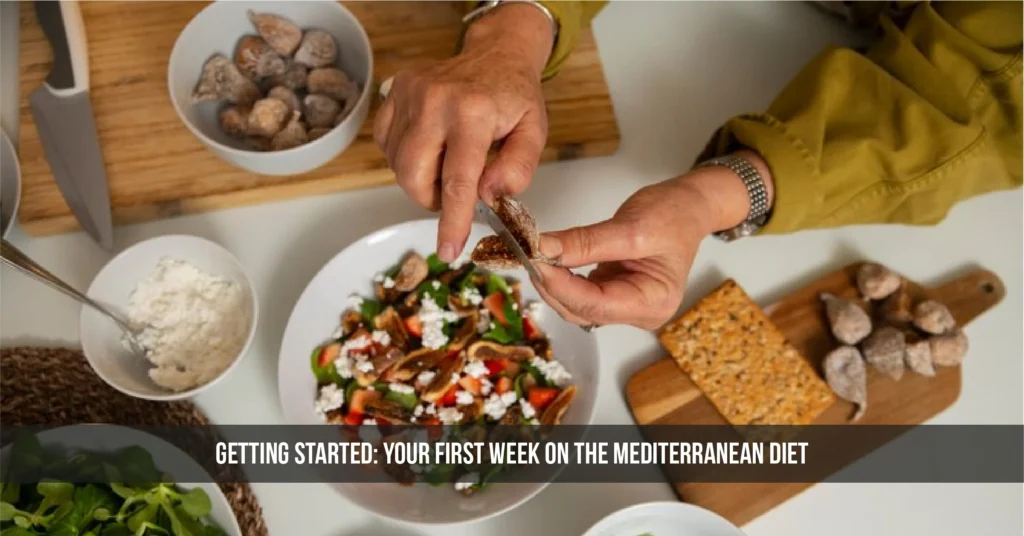Why a Mediterranean Diet Plan is Worth Trying
Thinking about a new diet? You might wonder about the Mediterranean diet. It offers many benefits and can greatly improve your health. It’s known to lower the risk of heart disease, type 2 diabetes, and some cancers.
Trying a Mediterranean diet can lead to a healthier life. This article will guide you on starting the Mediterranean diet, helping you see the advantages and make smart diet choices.
Table of Contents
Understanding the Mediterranean Diet: More Than Just an Eating Pattern
The Mediterranean diet is more than just food. It’s a way of life that has been around for centuries. It focuses on eating whole foods, limiting dairy and meat, and staying active. By adding Mediterranean diet recipes to your meals, you can enjoy its many benefits.
A good Mediterranean diet meal plan is key. It’s not just about what you eat; it’s about living a healthy life in every way. The Mediterranean diet food list is full of fruits, veggies, whole grains, and healthy fats, making for a balanced and nutritious diet.
Historical Background of Mediterranean Eating
The Mediterranean diet comes from the traditional eating habits of countries around the Mediterranean Sea. Over time, it has evolved, shaped by the area’s culture and geography.
Key Principles of the Mediterranean Lifestyle
The Mediterranean lifestyle is based on a few main ideas:
- Focus on whole, unprocessed foods
- Consume dairy and meat in moderation
- Stay active
- Eat with family and friends
Cultural Significance in Modern Times
Today, the Mediterranean diet is loved all over the world for its health perks and tasty recipes. By following a Mediterranean diet meal plan and checking out the Mediterranean diet food list, you can experience its benefits for yourself.
The Science Behind Mediterranean Diet Benefits
Exploring the Mediterranean diet reveals the science behind its many benefits. Research shows it can lower the risk of chronic diseases, including heart disease, type 2 diabetes, and some cancers. The diet focuses on whole foods like fruits, veggies, whole grains, and healthy fats.
This diet improves health and well-being. Key benefits include:
- Reduced risk of heart disease and stroke
- Improved blood sugar control and reduced risk of type 2 diabetes
- Lower risk of certain types of cancer, such as breast, colon, and prostate cancer
Recent studies highlight the diet’s positive effects on heart health. Research indicates it can lower blood pressure and cholesterol. It may also boost mental health and brain function.
Adding the Mediterranean diet to your life can enhance your health. It focuses on whole foods and healthy fats, helping prevent chronic diseases and improve your quality of life.

Why Should You Try a Mediterranean Diet Plan?
Choosing a Mediterranean diet can change your life, offering many benefits beyond weight loss. It can make you feel better overall. One big reason to try it is its great effect on heart health. It lowers the risk of heart disease and keeps your cardiovascular system healthy.
A Mediterranean diet is more than just food. It’s a way of life that includes eating well, staying active, and enjoying social time. It also helps you lose weight and keep it off, lowering the risk of diseases like diabetes and some cancers. Key benefits include:
- Reduced risk of heart disease and stroke
- Improved cognitive function and brain health
- Anti-inflammatory properties that help manage chronic diseases
- Effective diabetes management and prevention
By learning about the Mediterranean diet and adding it to your life, you start on a path to better health. So, why try a Mediterranean diet plan? It’s simple: it boosts your health and happiness, and it’s fun to follow.
Essential Components of the Mediterranean Food Pyramid
Creating a Mediterranean diet meal plan starts with understanding the Mediterranean food pyramid. It guides you to a balanced diet with whole, unprocessed foods. Your Mediterranean diet food list should include fruits, veggies, whole grains, lean proteins, and healthy fats.
A good Mediterranean diet meal plan mixes these foods:
- Whole grains, such as brown rice, quinoa, and whole-wheat bread
- Fresh fruits, like apples, bananas, and berries
- Leafy green vegetables, including spinach, kale, and broccoli
- Lean protein sources, such as chicken, fish, and legumes
- Healthy fats, like olive oil, nuts, and seeds
By adding these foods to your Mediterranean diet food list, you’re on the right path. Aim for whole foods and cut down on sugary drinks and saturated fats. With some planning, you can make a tasty and healthy Mediterranean diet meal plan that fits your life.
Building Your Mediterranean Meal Plan
To make a good Mediterranean diet meal plan, focus on key foods. These include whole grains, fruits, vegetables, and healthy fats. Start by thinking about what you like to eat and what you need.
A good Mediterranean diet includes lean proteins, whole grains, and healthy fats. For breakfast, try Greek yogurt with honey and walnuts or avocado toast with scrambled eggs. For lunch and dinner, go for grilled chicken or fish with roasted vegetables and quinoa or brown rice. Don’t forget healthy snacks like fresh fruits, nuts, or carrot sticks with hummus.
Breakfast Options and Ideas
- Oatmeal with banana and almond milk
- Whole-grain toast with avocado and eggs
- Greek yogurt with berries and granola
Lunch and Dinner Combinations
- Grilled chicken with roasted vegetables and quinoa
- Baked salmon with brown rice and steamed broccoli
- Lentil soup with whole-grain bread and a side salad
By adding these Mediterranean diet recipes to your daily meals, you can create a balanced and tasty meal plan that fits your needs and tastes perfectly.
Mediterranean vs. Other Popular Diets: What Sets It Apart
When looking at new diets, you might compare the Mediterranean diet vs. keto and other diets. The Mediterranean diet focuses on whole foods and limits dairy and meat. It’s known for lowering heart disease and type 2 diabetes risks.
The keto diet, however, is high in fat and low in carbs. It’s harder to stick to long-term and might miss some nutrients. The Mediterranean diet, though, is easier to follow and fits many lifestyles better.
Here are some main differences between the Mediterranean diet and others:
- It emphasizes whole, unprocessed foods.
- It limits dairy and meat but doesn’t cut them out.
- It’s rich in fruits, veggies, and whole grains.
- It encourages healthy fats, like those in olive oil.
Learning about the Mediterranean diet can help you make better choices. It’s great for improving health or managing certain conditions. Its balanced eating approach makes it a good choice for the long haul, benefiting your health and well-being.
Weight Management and the Mediterranean Approach
The Mediterranean diet focuses on long-term lifestyle changes for weight management. It emphasizes whole, nutrient-dense foods and healthy habits. This approach helps you lose weight sustainably, as it promotes a balanced relationship with food and your body.
To achieve balance, consider these strategies for sustainable weight loss:
- Eat a variety of whole, unprocessed foods, including fruits, vegetables, whole grains, lean proteins, and healthy fats
- Stay hydrated by drinking plenty of water and limiting sugary drinks
- Incorporate physical activity into your daily routine, such as walking, swimming, or other low-impact exercises
- Get enough sleep each night to support weight regulation and overall health
By following these guidelines and adopting a Mediterranean diet, you’ll see improvements in health and well-being. The Mediterranean diet is not just for weight loss; it’s about living a healthier, more balanced life.
| Food Group | Serving Size | Frequency |
|---|---|---|
| Fruits | 1 medium fruit | 2-3 times per day |
| Vegetables | 1 cup cooked or 2 cups raw | 3-5 times per day |
| Whole Grains | 1 slice whole grain bread or 1/2 cup cooked whole grains | 3-5 times per day |

Shopping Guide: Stocking Your Mediterranean Pantry
To start your Mediterranean diet journey, you need the right ingredients. A well-stocked pantry makes it easy to follow the Mediterranean diet food list. You can find many Mediterranean diet recipes online, but having the right ingredients is key.
When shopping for Mediterranean ingredients, consider these essential items:
- Extra virgin olive oil
- Canned beans and tomatoes
- Whole grains, such as brown rice and quinoa
- Nuts and seeds, like almonds and chia seeds
- Herbs and spices, including oregano and thyme
For budget-friendly options, buy in bulk and shop at local farmers’ markets. You can also find affordable alternatives, like canned tuna instead of fresh fish. It’s important to know how to store your ingredients properly. Keep them in a cool, dry place, and check expiration dates often.
| Ingredient | Storage Tips | Shelf Life |
|---|---|---|
| Extra virgin olive oil | Store in a cool, dark place | 6-12 months |
| Canned beans and tomatoes | Store in a dry place | 5-10 years |
| Whole grains | Store in an airtight container | 6-12 months |
By following these tips and stocking your pantry, you’ll be ready to make delicious and healthy Mediterranean diet recipes. These recipes will help you reach your health and wellness goals.
Common Challenges and How to Overcome Them
Starting a Mediterranean diet for health can be tough. Meal planning is a big challenge. It takes time to figure out what to eat. To solve this, make a meal plan for the week. Include breakfast, lunch, and dinner, and a grocery list to get everything you need.
Another hurdle is staying on track, especially when eating out or at social events. Why should you try a Mediterranean diet plan? It’s balanced and flexible, helping you make healthy choices. To stay on track, look for healthier versions of your favorite foods. Remember, it’s okay to slip up. Just get back on track at the next meal.
Some common challenges and solutions include:
- Meal planning: Create a weekly plan and grocery list
- Staying on track: Find healthy alternatives and don’t be too hard on yourself
- Grocery shopping: Shop the perimeter of the store and buy whole foods
Knowing the challenges and having a plan helps you succeed with a Mediterranean diet for health. Be flexible and adjust as needed. And don’t hesitate to ask for help from friends, family, or a healthcare professional if you need it.
| Challenge | Solution |
|---|---|
| Meal planning | Create a weekly plan and grocery list |
| Staying on track | Find healthy alternatives and don’t be too hard on yourself |
| Grocery shopping | Shop the perimeter of the store and buy whole foods |
Adapting Mediterranean Recipes to American Tastes
To enjoy the Mediterranean diet, it’s key to make recipes fit your taste. Start by adding Mediterranean flavors to dishes you already like. This way, you can stick to your diet while still enjoying your favorite foods.
Here are some tips for adapting Mediterranean recipes:
- Use local ingredients to give your dishes a unique twist
- Experiment with different spices and herbs to add flavor
- Don’t be afraid to modify traditional recipes to suit your taste preferences
These changes help you make healthy, tasty Mediterranean meals. You can find quick meals or family favorites that fit the Mediterranean diet.
Classic Recipe Modifications
Modify classic dishes with Mediterranean ingredients. Add feta cheese and kalamata olives to salads. Use herbs like oregano and thyme in soups and stews. These tweaks boost flavor and nutrition.
Family-Friendly Mediterranean Meals
Mediterranean recipes can please everyone in the family. Try Mediterranean-style pizzas with whole-wheat crusts and toppings. Or make casseroles and stir-fries with colorful veggies and lean proteins.
Getting Started: Your First Week on the Mediterranean Diet
Thinking about why you should try a Mediterranean diet plan? It’s more than a diet; it’s a lifestyle change. It can greatly improve your health. The Mediterranean diet for health benefits are many, including better heart health and weight management.
Start by looking at what you usually eat. Make a list of your foods and compare them to the Mediterranean diet’s focus on whole grains, fruits, and vegetables. Then, create a meal plan that fits your taste and needs.
Here’s a simple meal plan to begin with:
- Monday: Oatmeal with fruit and nuts for breakfast, grilled chicken with roasted vegetables for lunch, and quinoa with lean beef and steamed broccoli for dinner
- Tuesday: Greek yogurt with honey and walnuts for breakfast, whole grain pita with hummus and vegetables for lunch, and baked salmon with brown rice and sautéed spinach for dinner
- Wednesday: Smoothie bowl with banana, spinach, and almond milk for breakfast, lentil soup with whole grain bread for lunch, and grilled turkey with roasted sweet potatoes and green beans for dinner
Drink plenty of water and cut down on processed and sugary foods. By following this plan, you can start a healthier lifestyle. Discover why you should try a Mediterranean diet plan for yourself.
| Day | Breakfast | Lunch | Dinner |
|---|---|---|---|
| Monday | Oatmeal with fruit and nuts | Grilled chicken with roasted vegetables | Quinoa with lean beef and steamed broccoli |
| Tuesday | Greek yogurt with honey and walnuts | Whole grain pita with hummus and vegetables | Baked salmon with brown rice and sautéed spinach |
| Wednesday | Smoothie bowl with banana, spinach, and almond milk | Lentil soup with whole grain bread | Grilled turkey with roasted sweet potatoes and green beans |

Conclusion
The Mediterranean diet is more than just food. It’s a way of life that leads to lasting health and happiness. Studies show it improves heart health, brain function, and diabetes management.
To start, make small, lasting changes. Fill your kitchen with Mediterranean staples and plan healthy meals. Also, find ways to stay active every day. These steps can greatly improve your life.
Think of the Mediterranean lifestyle as a journey, not a quick fix. Enjoy the tastes, the company, and the mindful eating and exercise. This path will lead you to a healthier, more fulfilling life.
Also Read: When to Start Eating a Balanced Diet for Better Health
FAQs
What are the main health benefits of the Mediterranean diet?
The Mediterranean diet is known to lower the risk of heart disease, type 2 diabetes, and certain cancers, while also promoting weight management and overall well-being through its focus on whole, nutrient-rich foods.
What foods are included in a Mediterranean diet meal plan?
A Mediterranean diet meal plan includes whole grains, fresh fruits and vegetables, lean proteins like fish and poultry, legumes, nuts, seeds, and healthy fats such as olive oil while limiting processed foods and sugary drinks.
How do I start the Mediterranean diet if I’m new to it?
Begin by gradually incorporating Mediterranean staples like whole grains, fruits, vegetables, and olive oil into your meals, create a weekly meal plan, and focus on mindful eating and regular physical activity for a sustainable transition.
Is the Mediterranean diet expensive?
The Mediterranean diet can be budget-friendly. Buy in bulk, shop at local farmers’ markets, and choose affordable alternatives like canned beans and frozen vegetables.














Post Comment